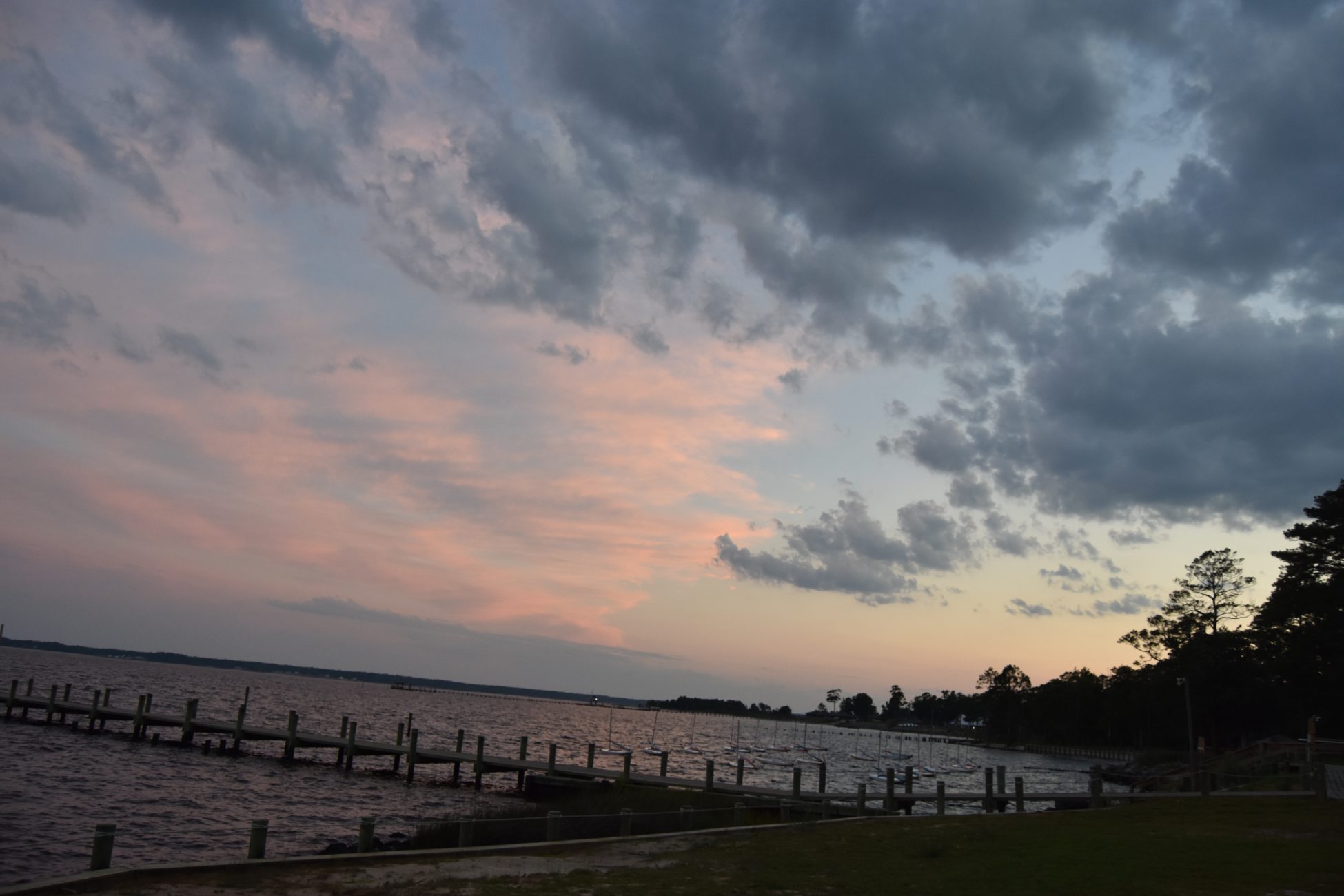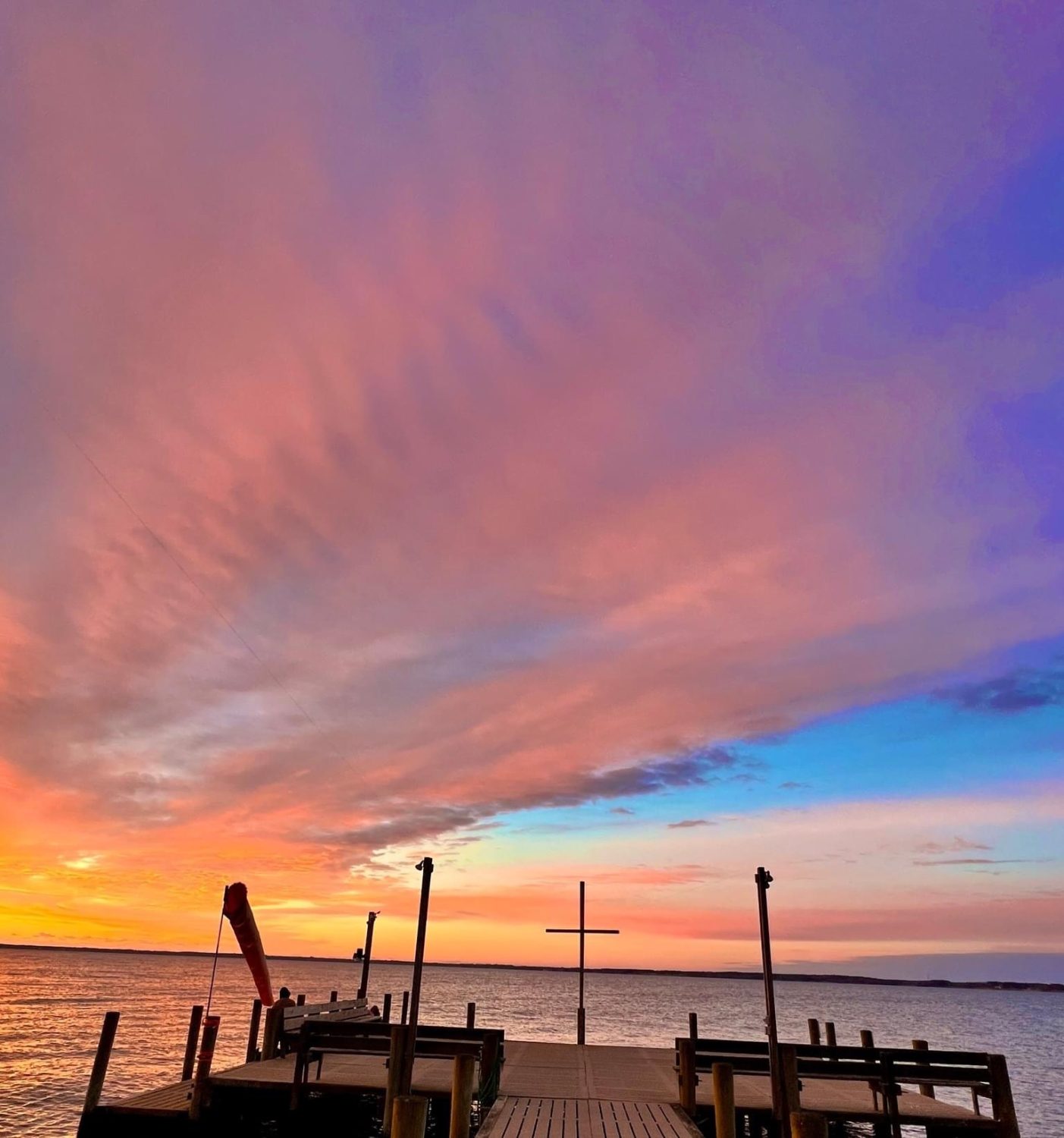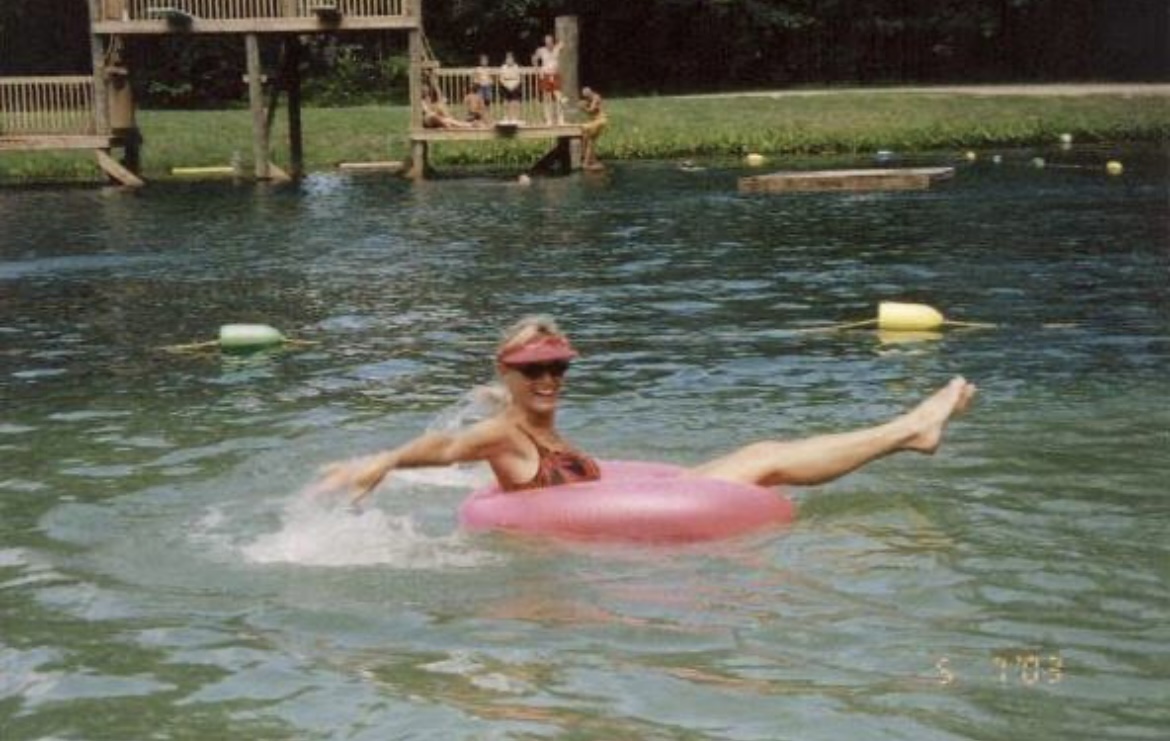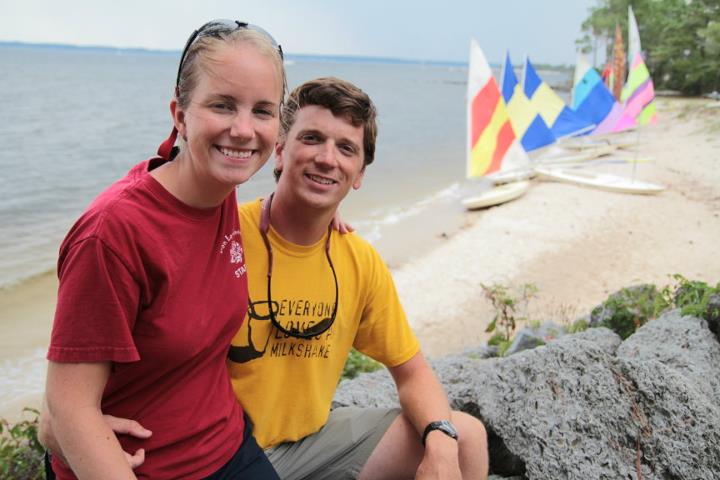Day 17: 2 John 1-13

2 John 1:6 “And this is love, that we walk in obedience to his commands. As you have heard from the beginning, his command is that you walk in love.”
As I reflect on this scripture, I visualize the many children, youth, teens, young adults, retreat groups, parents, clergy, and other adults that have walked in the sandy soil of the place called Camp Don Lee. I think of the stories my children told when they returned from a week spent in the summer of their elementary years. I think of the retreats my church families held on fall weekends.
All these images have an emotion attached: love. A love of the place, a love of the friend found, and a love of our Savior.
The scripture tells us that we are to walk in love with one another. When we spend time in fellowship and worship with one another, it strengthens us to walk in that love in our daily lives. We are commanded to carry that love to all we encounter and be God’s living examples in the world.
If you are reading this reflection, your life has been blessed by Camp Don Lee. You have experienced love in a dining hall, around a campfire, in Vesper Dale, and in the time counselors, staff, and pastors poured into you. It is our calling now to take that love and walk in it and share it with others. May our days ahead be reminders of sandy feet and walking in love with our Savior.
Prayer: Dear Heavenly Father, We give thanks for this season of reflection. We give thanks for those people and places that have blessed our life. We give thanks for the example you have set on how to live and how to love. May we now be encouraged to follow in the walk you have commanded and to love others as you have shown. Amen.
Submitted by: Paige McMillan- camper parent
Day 18: Matthew 14: 22-33

On the recommendation of several friends I have been reading through Robert Bell's book, Velvet Elvis. Midway through the book, Bell uses the story of Peter attempting to walk on the water to make a very important point. After reaching out to save Peter from sinking, Jesus says to Peter, "You of little faith, why did you doubt?" Reflecting on this story, Bell asks the question, who did Peter lose faith in? The answer is not Jesus but himself. Peter lost faith in himself. He stopped believing that he could do what Jesus called him to do. Bell goes on to say, "If the rabbi (Jesus) calls you to be his disciple, then he believes you can actually be like him. As we read the stories of Jesus' life with his disciples, what do we find frustrates him to no end? When his disciples lose faith in themselves." Bell's point is that God believes in us. God believes that we can do amazing things. So often we hear about our need to believe more in God or Jesus but what I am afraid we forget in our pursuit is just how much God and Jesus believe in us! What would it mean for us to learn to trust the One who first believes in us?
If I learned anything through my experience as a camper and staff member at Don Lee it was just this, God first believes in me! If I could sum up John Farmer's central message it is just this, "trust the one who made you to do great things through you." Imagine what could happen not only in our own lives but also in the world if we could reach a point where we dared to believe this was true. God has equipped us with tremendous gifts and talents. Do we believe it? How are we using these gifts? Dare we trust that God can use each and every one of us to help usher in the Kingdom of God on earth as it is in heaven?
Prayer: Dear God, thank you for giving me the gifts to navigate through the difficult waters ahead. Thank you for believing in me, and continue to remind me that I have what it takes to reach you. Amen.
Reprinted from 2007 Lenten Devotion. Written by Ben Williams. Ben and his family are long time campers, Ben is often a pastor in residence over the summer. Ben is the pastor at Christ United Methodist in Chapel Hill.
Day 19: Genesis 1:1-2

If you have ever sat on the end of the pier and looked out over the water, you have seen and felt the Spirit of God. Whether at sunrise or sunset, noon or on a starlit night, the end of the pier is a sacred place, and it is because "the Spirit of God hovers over the waters." No other place speaks of God's amazing grace quite like it. You can look out all around and see His creation, feel his Spirit, experience His Glory and His love.
Close your eyes and imagine being there now and feel His Spirit who lives in you. His presence is always there to love, encourage, empower, and direct.
Prayer: Father, thank you for your Spirit who lives in us and thank you for blessing a place like Camp Don Lee so that we, your children, can experience your Spirit hovering over the water. Amen.
Reprinted from 2007 Lenten Devotion. Written by Dianne Bruton. Longtime friend of Camp Don Lee.
Day 20: Psalm 22

My God, my God, why have you forsaken me? Why are you so far from helping me? I cry by day, but you do not answer, and by night, but find no rest. ( Psalm 22:1-2 ) This reading from the Psalms usually finds itself inserted into a Good Friday Tenebrae service. The question it opens with leaps off the page and into our ears, “My God, why?” It’s the very question every one of us has asked of God at some point in our lives. If not, we will in the future.
In, A Surprising Companionship, Jerry Webber expands the questions with these words:
Who are you, anyway? And where are you enthroned? Have I totally missed you?
Real questions, like these, are one of the reasons that people like us return again and again to the ancient poetry of the psalms. They remind us of our connection with human beings who lived and questioned thousands of years before us. Perhaps you also recognize some of these words as those employed by Jesus while he experienced the agony of crucifixion. Placarded on a Roman instrument of torture, an earlier version of the electric chair, or gas chamber, Jesus speaks these same words: “My God, why have you forsaken me.”
For centuries people from the Western hemisphere have seized on these questions and tried to make sense of them. I mean, why would Jesus, of all people, speak to God in such a way? The basic answer usually comes back to something that sounds like this: “God could not bear to look upon sin. On the cross Jesus was taking all the sin of the world ( past, present, and future) upon himself - sacrificially - so God turned the other way, and Jesus felt all alone and forsaken.
Well, as our friends down East would say: “That’s momicked up!” Another way of saying it is:”That’s a twisted understanding of Who God is. So, in your greatest moment of agony, God is the One who turns away and hides his eyes? Really? Middle-Eastern Christians for centuries have asked us to claim the questions of Psalm 22 when considering Jesus’ amazing love, but they have begged us to move beyond the questions to the Affirmation of Faith found in Psalm 22. That’s right, while hanging on the cross, Jesus utters ancient questions, but he doesn’t stop there. And every Hebrew person within ear-shot of the cross that Friday afternoon, knew exactly what Jesus was quoting from. They’d memorized the psalms as children.
I believe Jesus’ words were much more than the anguished cries of a man in pain - who felt abandoned by God. They were an invitation to all who would join him, to put their trust in God.
In you our ancestors trusted; they trusted, and you delivered them.
To you they cried, and were saved; in you they trusted, and were not put to shame.
As a wise old pastor reminded me over thirty-five years ago. “It’s okay to question God, or even to be angry at God, because if God is God - God can take it!” We can trust a God like that. And with Jesus we can pray:
Time and again, we have trusted You, O God, and You have delivered us. We have cried to You, and in our anguish You have not turned away, but looked upon us with mercy, and saved us. As it was in the beginning, is now, and ever shall be. Amen.
Submitted by: Jon E Strother- NCUMC Sound District Superintendent
Day 21: Isaiah 61:3

Lenten greetings from Surf City, NC. The beach is a beautiful place to live, and I love to get out there by the shore whenever I can.
When I do, I often see people scouring the shoreline for seashells. As they search, they often are seen bent over, sifting, scrutinizing and examining shells of all sorts and sizes. They look closely at the beautiful formations that often times create a prized shell.
My father used to collect shells, and he found some magnificent ones. He had collections that included conchs, olive shells, sand dollars, sea urchins, egg casings and the coveted state shell of North Carolina, the scotch bonnet. He was quite the sheller.
The shellers I observe sort through piles of shells, especially at low tide when the previous high tide deposited new treasures on the beach. Their routine goes something like this. They pick up a shell. Examine it closely. And, then, “whoof,” they toss it
aside. It’s repetitive. Pick up a shell. Examine it oh so closely. And, again, “whoof,” it is often tossed aside.
As I have watched this over the years, this routine continues repeatedly as the beach goers are trying to find that perfect shell – the one gem of a find that can go in their collection to fulfill their finds of flawlessness. Yet, what is found on the beach more often than not are shells that are not whole. They aren’t perfect. They don’t really resemble anything, much less, a prized shell.
On the beach (and in life,) people are looking for perfection. Yet, I propose that in brokenness, there is surely beauty. And, I recommend that the next time you are by the shore that you pick up a broken shell and examine it as closely as you would a “perfect” shell.
What can we see in broken shells? The colors are amazing. Purples and orange, pinks and yellows, creams and white. The textures are incredible as well. Broken shells reveal ridges as well as soft smooth edges, bumps and grooves, wavy lines and
rough folds.
And, all of that makes me wonder what these once-whole shells have gone through to become fragments of their former selves. Did a seagull drop it on a hard surface to extract the live animal from it for sustenance? How many waves have crashed down upon it to shatter it into the pieces we find on the beach? How many times did the course sand smooth the pieces to produce its glossy edges?
As I recall the shellers on the beach here on Topsail Island, I also think that of anyone on this planet, we, as Christians know brokenness.
We have certainly seen it in our communities and churches. We experience it through broken relationships. With all the angst in the world, there are people who are broken spiritually and emotionally. We find ourselves broken over real or perceived failures. And, we can feel brokenness even from events that haven’t occurred through the anticipation of an unknown future.
Scripture promises that God remains with those who are broken and makes them stronger than before. In Isaiah 61:3, God promises to give those who mourn and are broken “a garland instead of ashes, the oil of gladness instead of mourning, the mantle of praise instead of a spirit of fainting.”
I find broken people of this world to be brave and beautiful, resilient and strong. Camps Chestnut Ridge, Don Lee and Rockfish have a faith-filled passion that allows them to respond to the calling to serve this broken world and to share the love of Jesus Christ at each of those delightful and unique sites. Among the many campers and guests we serve, we see many who have rough edges, those who have gaping holes in their hearts, those who are worn out and those who are simply broken.
Our mission is not to make them “whole” again. Rather, our campers and guests are welcomed as they are, and this camp and retreat ministry helps them understand how utterly beautiful and valuable they are and that they belong in the “collection” of God’s love and grace.
I hope and pray that you find beauty in brokenness during this Lenten season.
Submitted by: Dail Daly Ballard - NC UM Camp & Retreat Ministries, Inc. Executive Director
Day 22: John 1:1-9

Every Lent, the first story we hear frames the whole journey: Jesus being sent into the wilderness to face hunger, thirst, temptation … and it always sounds a little bit like the beginning of every story I would hear on overnight sailing trips. Leaving the comfort of camp, and the abundant provision of the dining hall … and journeying out to other shores where you’ll be responsible for navigating your boats, pitching your tents, and cooking the chicken to ensure no one ends up with any … extra … challenges.
While I never got to go on an LIT trip to Portsmouth, those were always the trips I looked forward to the most for campers. I loved that for most of them, this was a final step of a summers-long journey as a Tweeker, Mariner, and finally an LIT.
As someone who did not grow up at Don Lee, it took some time to understand that we really, truly, sent teenagers into the ocean on sailboats under the supervision of 21-year-olds. On paper, it sounded like a terrible idea. And for those of you who are reading this who aren’t closely familiar with the program and the Portsmouth trip, you probably would agree, right?
And even after hearing more stories about these trips … it continued to seem, in theory, like a terrible idea. Stories of black spots on the radar, masts breaking, powerboat engines failing, Coast Guard rescues … how could this be a good idea?
Except, every year, when those campers returned. Those sunburned, dehydrated, often injured, exhausted, un-showered campers – they also returned enthusiastic, encouraged and proud. “We almost died – and it was the best week of my life!” was a comment I heard regularly.
There’s something about the wilderness that we all need. There’s something about a journey that tempts us, challenges us, forces us to confront our own shortcomings and limitations, that also shapes us in all the right ways.
We usually see Jesus’ story as one of temptation and trial only. This wilderness is not a good place, right?
Except every step of the way, Jesus is prepared, Jesus is sustained, not by his own knowledge or understanding, but by his connection to scripture, and the words of the prophets. He quotes the prophet Isaiah as he meets the tempter at every turn. God provides for him in this time, just as God has provided for generations before him. Even for the son of God himself, the wilderness is a place where he is even more formed in his identity as the fulfillment of the prophets, and the hope for the future.
Turns out, we all need the wilderness. And we’re not the first ones to have learned this. Tale as old as time. Our ancestors for generations have been going into the wilderness … and if we pay attention to their journeys, maybe we can learn something.
Maybe we can discover that we need the wilderness, not simply for the outcome, but for the journey itself.
What is the wilderness teaching you this year in Lent? How is God’s provision showing up for you in new ways? And how are you being formed more into the person that God is calling you to be?
Prayer: God of the wilderness, open our eyes to see your care for us and who you are shaping us to be in this time. Amen.
Submitted by: Melissa Cooper - Faith Formation and Retreat Ministries Coordinator 2009-2011
